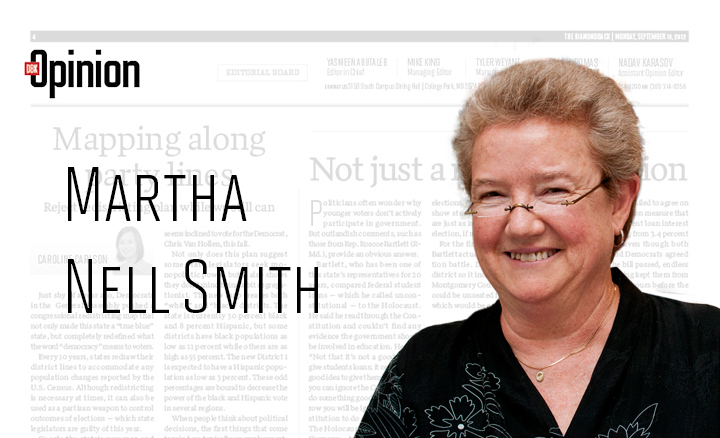
Martha Nell Smith
“Drug overdose is now second only to motor vehicle crashes among the leading causes of unintentional injury deaths” in the united states.
“Students who are aware that a medical amnesty policy is in effect are 2.5 times more likely than students who expect to face disciplinary actions to call for help when witnessing the signs of alcohol poisoning.”
-Senate Student Conduct Committee Report
The first time I walked across McKeldin Mall at the heart of our campus as a newly hired professor, a reporter asked me if I worked here, and when I affirmed that I did, stuck a microphone in my face: “What do you think about the death of Len Bias? Who’s responsible?”
I did not know then, and I do not claim to know now, exactly what happened in the early hours of June 19, 1986. However, some think the graceful Terrapin star (who had the sweetest shot in college basketball) had been unconscious for a few minutes, maybe more, before EMS was called at 6:32 a.m. Bias was taken to Leland Memorial Hospital and pronounced dead at 8:50 a.m.
To settle what actually happened in that case is not my concern here. My concern is that no student should ever be hesitant to call 911 if a fellow student appears to be having a medical emergency because of an overdose of alcohol or any drug, whether legally or illegally obtained.
I was, therefore, pleased to see the University Senate did the right thing Thursday when it overwhelmingly voted to expand the Good Samaritan policy to include drugs. No student should have to worry about calling for help when a fellow student is in trouble, whatever the circumstance. As chairwoman of the University Senate, I could not vote on the matter, so I welcome the opportunity to say this is an important advancement in helping to ensure student safety.
The policy on which the senate voted is reasonable and nuanced, one with exclusions that do not promote recklessness but remind all campus citizens that “state law provides that the ‘act of seeking medical assistance for another person who is experiencing a medical emergency after ingesting alcohol or drugs may be used as a mitigating factor in a criminal prosecution.’”
I urge all campus citizens to read the January 2013 Student Conduct Committee report — which uses the statistics I quoted at the beginning of this column — to be mindful of one another’s health and well-being, to remember that we are a community in which compassion and proactive kindness, not fear, should always prevail.
This report does not recommend irresponsible use of drugs or alcohol, and neither do I. Adopting it will not promote that either. What it recommends is that we foster an environment in which safety, and members of the community taking care of one another, always comes first. Always. No exceptions.
The Student Conduct Committee report quoted above can be found at http://bit.ly/YEWOpy.
Martha Nell Smith is the University Senate chairwoman and an English professor at this university. She can be reached at mnsmith@umd.edu.



